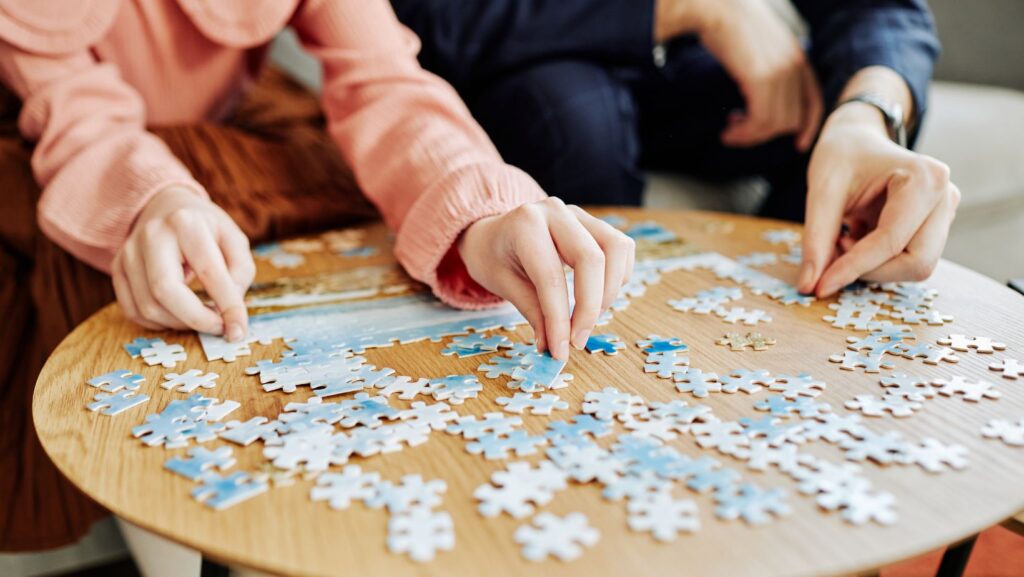Research proves that playing video games could improve cognitive capabilities like memory, problem-solving, and reaction times. They can also improve patience, which doesn’t always require high-end video games. The structured challenges found in various types of games can help to train your mind through anticipation and adapt your thinking according to the patterns detected.
Different game types improve patience and critical thinking in unique ways, whether enjoying slots, playing board games, competing in the latest video game title, or even spending some time in a digital escape room. You learn to manage frustrations while making better decisions through playing various games.
Card Games
Playing card games isn’t just about taking a chance on winning something. They offer plenty of opportunities to learn problem-solving and patience, especially as a beginner who must still learn the poker, baccarat, and blackjack strategies from scratch. You’ll find leading choices here to help you practice strategic thinking online, and train your critical mind to solve problems faster and better as you start learning to identify patterns and read body language.
These sites offer a range of strategy-based card games, with some even introducing live dealers and the social interaction of playing against other genuine players from your phone or laptop. You can practice a poker face during a live event against other real players to improve your patience or look for betting and behavioral patterns among blackjack players that help you adapt your strategy to win the next hand, improving your problem-solving skills.
Simulation or Sandbox Games
Simulation and sandbox games like Cities: Skylines and Minecraft provide open-ended worlds that allow players to set goals and creatively solve problems. These games typically require a lot of patience because managing virtual resources, building complex structures, and creating functional systems can take many hours or iterative and careful planning.
Managing multiple variables at the same time teaches problem-solving skills when players must plan layouts, balance resources, and anticipate design choice consequences. You can learn to experiment with new ideas, adapt strategies, and patiently wait to see how the plan unfolds. Players tend to develop analytical and creative skills. Sandbox and simulation games train the mind to approach every challenge methodically and thoughtfully.
Board Games
A recent study on chess players revealed that the game can improve attention, information processing, and executive function in the frontal lobe. That means it’s a well-known board game used to improve problem-solving skills. How the game teaches patience is seen in how every move can result in multiple consequences. Players must patiently assess the board before making a strategic move that requires logical reasoning. Chess players often excel in various other everyday life activities because of their advanced problem-solving abilities.
However, other board games like Catan and Settlers offer different training. Players have to balance resource management carefully with negotiations while waiting for the best dice rolls to reinforce the strategy. This requires patience, while planning can train the critical mind to solve problems before they even occur.
Digital Escape Rooms
Never underestimate digital experiences that double as games, such as escape rooms. Scenario-based challenges that put players in a virtual environment that requires patience and problem-solving to escape will train those cognitive abilities. Players have to carefully examine the digital clues left around the room, interpret various interactive elements, and solve actual themed puzzles in the right order to escape.

These games typically demand observation skills, critical thinking, and the control of impulsive decisions. They train the brain through logical deduction, structured planning, and time management, as players must often experiment with various approaches. The games require problem-solving but also patience, as the wrong sequence keeps players trapped.
Video Games
Modern video game titles allow players to access challenges that demand patience and problem-solving. Role-playing titles like The Legend of Zelda typically train the mind with puzzles, exploration, and resource management. Progress isn’t instant, and working through obstacles carefully and patiently helps gamers apply more logic for better problem-solving. Even more recent titles like the ReturnalGirl adventure with hidden secrets encourage patience through resource management and problem-solving to develop strategies.
Other strategy-driven titles like XCOM 2 or Civilization VI encourage players to think outside the lines and develop critical capabilities. Any decision made will affect the results, and bad planning could cause issues for many turns to come. Success demands patience while following long strategies and carefully assessing the weaknesses and strengths of each choice.
Casual Games
Even casual games on your smartphone can provide patience and problem-solving skills in small doses. Titles like Monument Valley require players to remain patient and calm while solving simple puzzles, while Candy Crush uses increasingly difficult levels to train persistence and fast decision-making. Each session provides a short training stint, but they reinforce the importance of trying repeatedly until adapted strategies break through the challenge.
Mobile games offer controlled environments in which you can spend a few minutes training simple cognitive skills between meetings or on a commute to work. These skills become essential in everyday life, especially when public transport tests the patience you just developed through a few game rounds, or you need a quick mental refresh before presenting a new idea at work.
Puzzle Games
Puzzle games engage problem-solving capabilities on a deeper level, while some require a bit of patience. For example, Sudoku can help you to practice deductive reasoning. However, the puzzle also requires patience to mentally and physically scan each line, row, and block to deduce the right choices.
Crosswords and digital puzzles also teach patience because many puzzles can’t be solved right away. Crosswords require participants to perhaps find the fifth answer before they can revert to the first. These skills become integral to the real world, allowing you to remain calm and persistent when analyzing situations of any kind before making more logical decisions.



